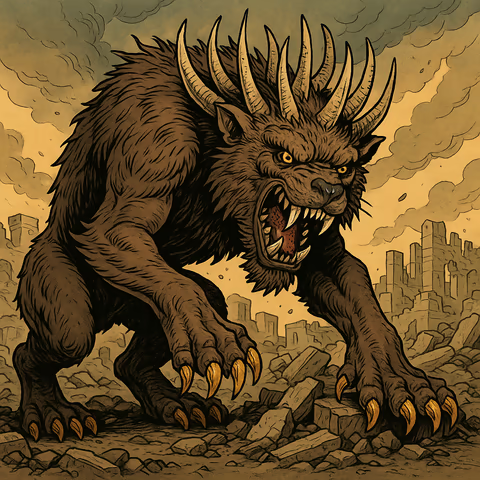
Differences in the Old Greek Version of Daniel (Chapter 7)
The four beasts
This chapter of the ‘Old Greek’ version of Daniel contains 28 verses. Of these, 10 have differences.
Most are small and may be meaningless to many readers. However, some specific differences may, perhaps, be due to deliberate changes made by the Pharisees to discredit Jesus and Christians.
Pharisaic tampering?
Remember, the Christians accused the Pharisees of tampering with prophecies of the Messiah to discredit them and Jesus. Well, here is such a prophecy in 7:13.
Recall that Jesus referred to himself as the ‘Son of Man’ (or as we translate it, ‘human being’). Well, this is one of the locations in which the ‘Son of Man’ appears. The Old Greek says he is ‘present just like one of ancient days.’ Now, the Ancient of Days is, of course, God. So he’s described as looking like God!
Christians absolutely said this about Jesus.
Recall how Jesus described himself as a ‘reflection of God’s image’ (Hebrews 1:3); and the Apostle Paul described how Jesus shares ‘the same form as God’ (Philippians 2:6). Well, how suspicious that here in the Masoretic version of Daniel 7:13, the Son of Man does not share the same appearance as God… The reference is gone.
No, in that version, the Son of Man merely ‘approaches’ the Ancient of Days, and is ‘present before him.’ The link is not there.
So, perhaps this is one of those places that the Pharisees either changed the text or cherrypicked a variant that suited them better. Who knows?
The fall of Rome
There’s a small but interesting difference in how the fourth beast is killed in 7:11 and 7:26.
Common interpretations propose that the fourth beast is the Roman Empire (the four are: Babylon, Persia, Greece, and Rome). However, the Masoretic version of that verse makes it sounds like that ‘beast’ is destroyed just as quickly and suddenly as the others. It simply says the ‘beast’ will be ‘destroyed and killed.’
However, the fall of the Roman Empire was very different from the others!
Rome took many centuries to fall, and it didn’t fall all at once, but was taken away, piece by piece.
Well, the Old Greek text may provide a more accurate prophecy — centuries before it all happened. In the Old Greek text, the fourth beast is ‘defiled’ and then ‘beaten to death’.
Now, if you imagine what it means for something to be ‘defiled’, you may think of things being infultrated, spoiled, corrupted, and so on. Doesn’t that well describe how the Roman Empire fell?
It was indeed ‘defiled’ by:
- Internal decay,
- Corruption,
- And some would say it was defiled by Christianity!
And as for being ‘beaten to death,’ that takes time; it’s not like a beheading which is over in a second. It could even suggest several people doing the beating.
Well, the Roman Empire was not suddenly killed. It was, you could say, ‘beaten to death’ by:
- Various barbarians’ incursions,
- Political splits,
- Inflation,
- Plagues,
- And more…
Today, historians can’t agree exactly when Rome fell, only that it eventually did.
This contrasts with the previous empires:
- The Babylonian Empire: Taken in a single night.
- The Persian Empire: Swiftly conquered by Alexander the Great.
- The Hellenistic kingdoms: Conquered by the Romans and incorporated into their Empire.
The fall of Rome was a long, drawn-out affair, in an entirely different way to the other empires, and this appears to be more accurately described in the Old Greek text.
But… Why would anyone change these details in the Masoretic Text? (If indeed, that’s what happened.) We have no clue, but perhaps scribes simply didn’t appreciate these details, and summarised them with blander terms.
However, one other change may have an explanation…
The horn — worse or different?
In 7:24, the Old Greek describes the king (a horn) who is ‘worse than the others’. He’s the horn (king) who displaced three other ‘horns’ (kings). But the Masoretic text doesn’t say ‘worse’, it just says the king was ‘different’. Why might that be?
Well, it could be a simple interpretative translation, where the translator is putting his own spin on it. However, there’s another possibility.
In ancient times, many people interpreted the ‘small horn’ to be various Roman Emperors. If Jews and Christians widely viewed the Emperor as the small horn (who was ‘worse than the others’), could the guardians of the Jewish Scriptures have seen the danger of such an insulting phrase? Perhaps. If so, they may have changed the Aramaic to a more neutral term, ‘different.’
This can’t be understated. At that time, insulting the Emperor was classed as maiestas (treason), a capital offence, and you had to be wary of the delatores (informers). Who were they?
These individuals could gain financially or politically by accusing others of treason or other crimes. This created an atmosphere of suspicion and fear, where even private remarks could be reported and lead to charges. Friends, family members, or slaves might be coerced or encouraged to testify against someone.
So yes, people had to be extremely careful about what they said about the Emperor. Calling a particular Emperor ‘worse than the others’ could be very dangerous. So this may explain why someone may have changed the Aramaic to say ‘different’. But this is all speculation, we don’t have any direct evidence of this.
So, the Old Greek text of chapter 7 may be a better, more original, and more accurately fulfilled version of the prophecy. Of course, this is all hard to prove. It’s all speculation until some solid manuscript evidence turns up one day.
Differences
7:1-3
No important differences.
7:4
The Old Greek text specifies that the first beast was a ‘lioness’ (female), but the Masoretic Text uses a masculine noun for ‘lion.’ This couldn’t be a misreading of the Aramaic, as the two words are visually very different, and the Greek words aren’t particularly similar either. So this must be a deliberate change for some unknown reason.
7:5
No important differences.
7:6
The Old Greek text does not have a detail present in the Masoretic Text, where it says that the leopard had a ‘dominion given to it.’ Either it was lost from the Greek, or added to the Masoretic Text later.
7:7
No important differences.
7:8 (i)
The Old Greek text says that there were ‘many plans in the horns,’ whereas the Masoretic Text has DaniEl say that he was ‘considering the horns.’ This does not appear to be an accidental mistranslation, because the words are too different, and are also different in Greek, ruling out a simple copyist error.
Could this be a deliberate alteration? If so, why? And was it the Greek or the Masoretic Text that was changed? We don’t know.
What the Masoretic Text say here flows better in this verse, as it has DaniEl looking at the horns just before the new one appears. So perhaps the answer is that sometime down the centuries, a Greek copyist was working from a damaged section, and had to guess the word when he wrote the new copy. We have no idea, but that’s a neat theory, and it fits the next difference… in the same verse!
7:8 (ii)
The Old Greek text says the three other horns were ‘withered away’ by the large horn. The Masoretic Text instead says they were ‘plucked out by their roots’.
There’s no obvious way it could be a misreading of the Aramaic. However, it’s possibly a copyist error in the Greek’s transmission, as the word for ‘withered’ looks a bit like the word for ‘plucked out’:
- ΕΞΗΡΑΝΘΗΣΑΝ (withered)
- ΕΚΡΙΖΩΘΗΣΑΝ (plucked out)
So, maybe if the manuscript that someone copied was damaged or smudged, or was being dictated and was mis-heard, then yes, this could be a Greek copyist error. It would certainly match our theory about the previous difference.
Therefore this and the previous difference could be copyist errors introduced centuries after the book’s translation, and has nothing to do with the real text.
7:8 (iii)
The Old Greek text adds that the great big horn ‘made war against the holy ones’, but the Masoretic Text doesn’t mention this yet (it’s mentioned later).
7:9-10
No important differences.
7:11
The Old Greek text is a little more specific in saying that the beast was beaten to death, using a similar word which describes beating a drum.
This is very unlikely to be a misreading of the Aramaic by our Greek translator, as קטילת doesn’t look like a word for ‘beaten to death’. The Greek words are also very different, with the Greek word being particularly rare and from a different root to a word for ‘beaten’ (ΑΠΕΤΥΜΠΑΝΙΣΘΗ versus ΑΠΕΚΤΑΝΘΗ). So that rules out a simple copyist error.
So, this could be a deliberate change — either made to the Greek, or made to the Masoretic Text after the Greek was translated. Why? And by whom? We don’t know.
Perhaps the Greek translator decided to make the text more colorful, or perhaps there was some more damage to the manuscript, and he had to guess what the word was. Or perhaps the Masoretic Text was simplified at some point, and they didn’t appreciate this little detail.
We just don’t know.
What we do know is that, for whatever reason, the Old Greek text is more accurate here if we interpret the text as describing the fall of the Roman Empire.
7:12
No important differences.
7:13
The Old Greek text describes the person like a ‘son of man’ (which we translate as ‘like a human being’) differently; it says he was ‘present just like one of ancient days’. In contrast, the Masoretic Text says he simply ‘approached the Ancient of Days and was present before him’.
The typical reading is that this ‘human being’ is present in some manner like God. That could mean he’s in a situation that’s God-like, or that he himself is God-like. Or both.
If Christians applied this verse to Jesus in glory, it seems be a little watered down in the Masoretic Text as he loses his god-like appearance. Could this be a deliberate change? Perhaps, yes.
It seems like too much of an important detail to add for no reason, and likewise too important to remove for no reason. So it was either some horrible accident from a damaged manuscript, or a deliberate change.
We simply don’t know for sure, but the possibility that it was a deliberate change to discredit the Christian view of Jesus is intriguing.
7:14-16
No important differences.
7:17 (i)
In the Old Greek text, the angel explains that the four beasts represent four kingdoms, but in the Masoretic Text, he says it represents four kings. This may be a distinction without a difference, but it’s interesting to note.
7:17 (ii)
Here in the Old Greek text, the angel says these kings will:
‘…perish on the earth.’
But the Masoretic Text says they’ll:
‘…arise out of the earth.’
This is a big difference! The Old Greek is jumping ahead to the fall of the Roman Empire, but the Masoretic Text is talking about future kingdoms arising.
First, the most obvious thing to point out is that the Old Greek is more accurate, because the messenger is talking to DaniEl during the first year of BelShazzar’s regency, ergo, during the last days of the Babylonian Empire… Babylon was not going to arise out of the earth, it did that long ago! You could even argue that the next empire, Persia, had already arisen and was on the ascendency too.
In contrast, the Old Greek is perfectly accurate, because all four are yet to perish!
The reason for this difference is unknown. There’s no obvious way for the Aramaic wording to have been misread like that, nor is there any obvious Greek copyist error that could turn one into the other.
Perhaps the Greek translator was working from a damaged manuscript, and had to guess what the word was, or perhaps he wanted to make a very subtle change to the text. Or perhaps the Masoretic Text was paraphrased or changed for some reason later.
There are no clues to go on.
7:18-23
No important differences.
7:24
The Old Greek text has the angel describing the king that comes after the others as ‘worse than the others’, but the Hebrew instead says he’ll merely be ‘different’ from the others.
It’s not likely that this is a misreading of the Aramaic, nor a Greek copyist error.
Either:
- It’s an interpretative translation, where the translator put his own spin on it.
- Or it’s a deliberate change, where a Hebrew/Aramaic scribe wanted to make the text more neutral.
We don’t know which, but it’s interesting to note. There is a possibility that the Masoretic Text was changed to be less insulting to the Roman Emperor, as that’s how the text was often interpreted at that time, but this is just a guess.
7:25
No important differences.
7:26 (i)
The Old Greek says they will ‘utterly destroy’ the beast’s authority, but the Masoretic Text says they will ‘take away’ its authority.
Obviously, ‘utterly destroy’ is much stronger than the passive ‘take away’. There’s no obvious way to misread the Aramaic this way, nor an obvious similarity between the Greek words to cause a copyist error. So this is a deliberate change, either by the Greek translator, or to the Masoretic Text later.
If we compare this with what happened to the Roman Empire, we know that its authority was indeed actively destroyed, not passively taken. It was a series of actions to deliberately attack it, it wasn’t eclipsed by another power to become second-rate to somebody else. So in that sense, the Old Greek is more accurate.
However, it still may have been a translator choice to make the terms match up, so we don’t know.
7:26 (ii)
The Old Greek text say the court will:
‘…defile and destroy’ the beast.
But the Masoretic Text says it will:
‘…destroy and kill’ it.
Notice that one will ‘defile’ it before killing it. The word is μιᾶναι (mianai), which could be translated as:
- stain
- defile
- pollute
We have already explored this in our introductory comments above and how it very well describes what happened to the Roman Empire. However, we can also add that this can’t be a misreading of the Aramaic, as the words are too different, and the same goes for the Greek terms, being too different to be confused easily by a later copyist.
The change is deliberate, and it’s impossible to prove which version is the original. All we know is that, yet again, the Old Greek is more accurate.
7:27-28
Here the Old Greek text probably has a silly translation error, or a later copyist error.
There’s a little extra phrase to the end of verse 27, saying the holy ones will rule the kingdom ‘until destruction of the word/matter,’ but this seems to be a simple confusion with the start of the next statement which appears in the Masoretic Text as ‘And this is the end of the matter’.
It seems likely that the ancient Greek translator got confused and made a silly mistake here. However, the issue doesn’t really matter much as it’s just a throwaway phrase, and we have fixed it in our translation with an [insertion] linking to a translator note.
Contents
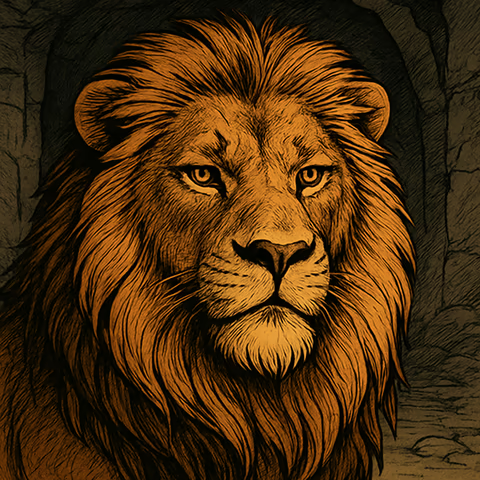 Introduction to
Introduction to
Differences in Daniel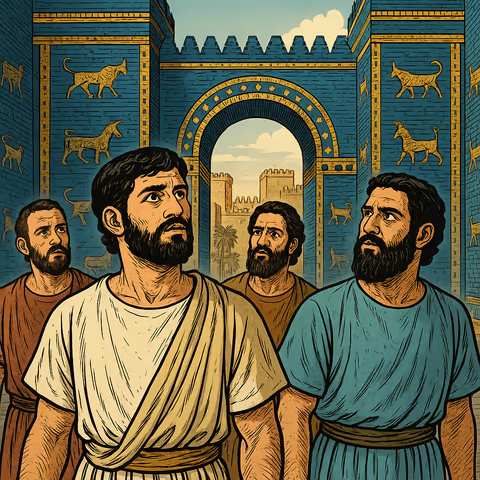 Differences
Differences
in Chapter One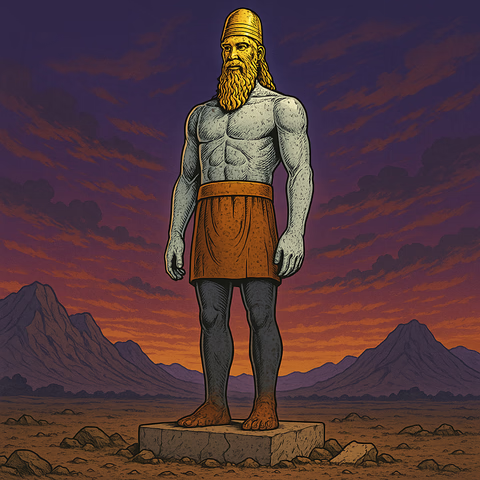 Differences
Differences
in Chapter Two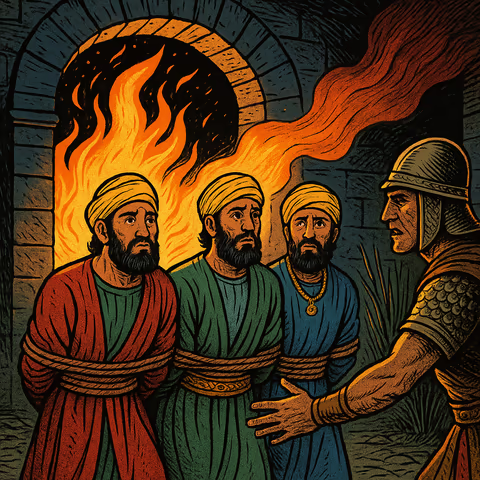 Differences in
Differences in
Chapter Three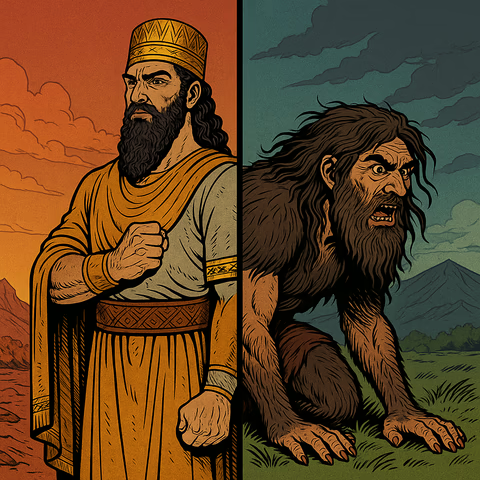 Differences
Differences
in Chapter Four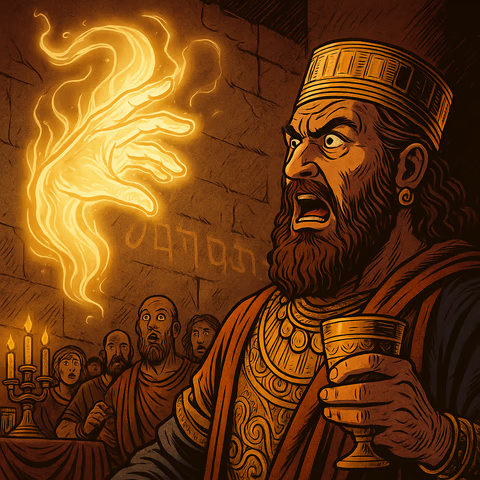 Differences
Differences
in Chapter Five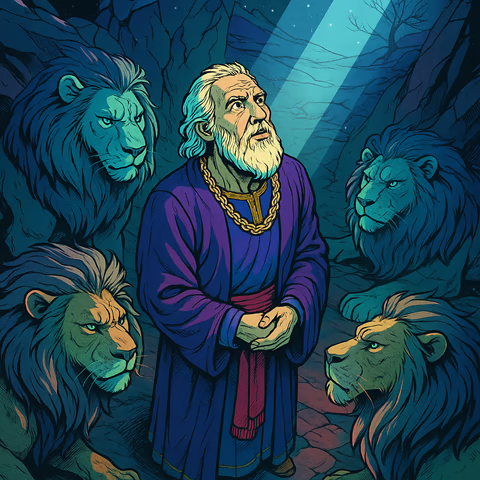 Differences
Differences
in Chapter Six Differences in Chapter Seven
Differences in Chapter Seven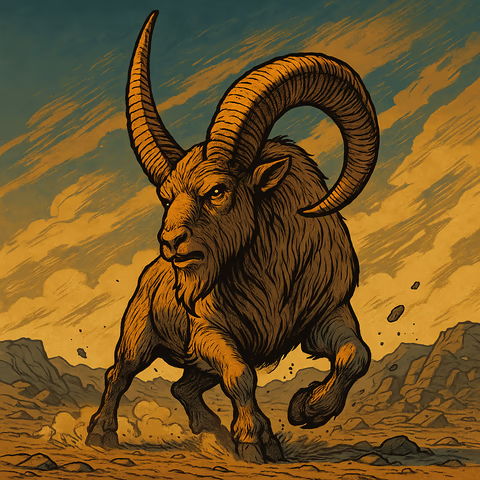 Differences in
Differences in
Chapter Eight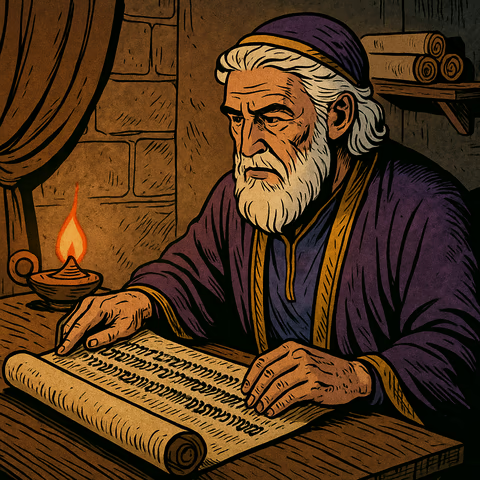 Differences
Differences
in Chapter Nine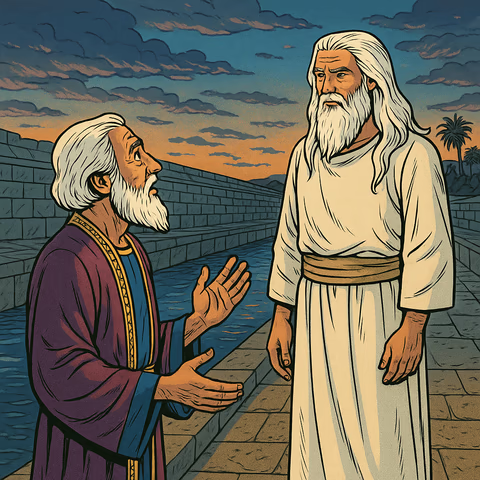 Differences
Differences
in Chapter Ten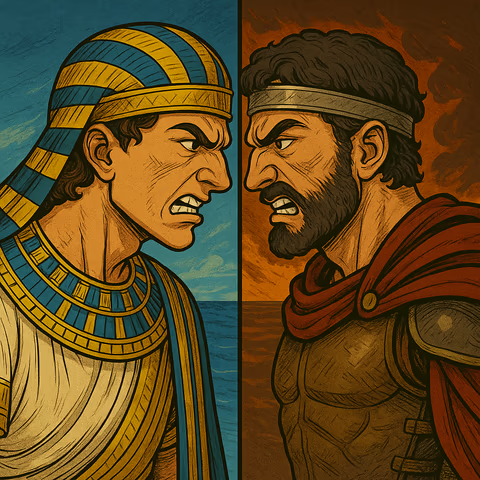 Differences in
Differences in
Chapter Eleven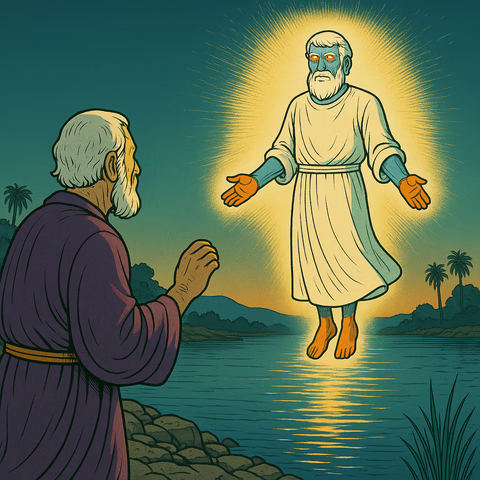 Differences in
Differences in
Chapter Twelve